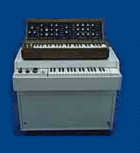






































|
Józef Skrzek - Koncert Świętokrzyski

Comments:
This is an interesting CD that I recently received from Poland. Józef Skrzek is the keyboardist for the well-known Polish prog band SBB. The band released over a dozen albums since forming in the early 70s, but Józef put out an even larger amount of recorded material on the side. Koncert Świętokrzyski is a new reissue on Wydawnictwo 21. Recorded in 1983 at the Holy Cross Church in Warsaw, this recording was entirely done using Church Organ, Moog synths, and voice. While many will assume that the music is of a religious nature, surprisingly a Klaus Schulze/Sven Grunberg influence starts to emerge a few minutes into the first track. Track 1, "Zbliż się do mego serca", comes off a bit traditional at first. The Church Organ sounds exactly like you would imagine, and the chords are typical of Church music. But as soon as Józef comes in with vocals, your ears realize that the music is slowly venturing into new territory. Józef's vocals remind me of the gentle vocal styles found in Italian prog. There is a subtle melodic style that is instantly likeable and warm, even if you don't understand Polish. Soon, the more traditional sounds coming from the Church organ gives way for drones and eerie chords. While I'm reminded of ambient music, the flow of the music is stronger here. Sven Grunberg's Breath also comes to mind almost instantly. I'm sure Moog is present during the first 5 minutes of the first track, yet the way Józef manipulates the Church Organ to produce unique tones makes me unsure which instrument is which. By track 2, though, the Moog synth takes the spotlight with a funky bass vamp ala early Kraftwerk. After this point, the music alternates between traditional, electro-ambient, and Kraftwerk-like funk. Playing this CD in the car, I tend to doze-off during the ambient sections, wake-up during the grooving parts, and listen in awe when the majestic Organ unleashes her power. My only complaint, overall, is with a couple of tracks sung in English. While they are not awful, the Polish vocals sound so much better. Hmm, I don't know what else to say except that Koncert Świętokrzyski is a unique release that will impress collectors of keyboard-based music. Ambient music collectors will find a lot to like here.
Address:
Wydawnictwo 21
PO Box 1, 05-118 Legionowo 6, POLAND
Email:
wyd21@poczta.fm
François Breant - Sons Optique
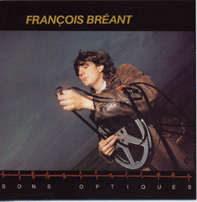
Comments:
When I got this CD in the mail recently, I had no idea what to expect. The album cover did not help since it gave me a weird feeling that Mr. Breant was some sort of 80s New Wave musician. But as soon as the music started playing, I was immediately relieved and impressed. Fans of Franco Battiato, mellower RIO, and avant-garde film music will be in for a treat with this disc. Apparently, François Breant is French keyboard player who is well known for helping out some of France's best known classic pop singers. In 1979, he released his first album, Sons Optique, helped out by fellow French musicians Didier Lockwood, Albert Marcoeur, and Guy Delacroix. Being a fan of avant-prog rock, my ears immediately loved the sounds coming out of my speakers. Breant at the time seemed interested in mixing syncopated Bartok-esque piano lines, and Chekalin-like electro-symphonic sound experiments with all sorts of Battiato-like synth and electric keyboard explorations(and I'm talking about dozens of unique synth tones). Violin, oboe, percussion, and experimental bass also add their part to the dozens of different sound explorations. The album, overall, sounds like a series of soundtracks written for an avant-garde film. Yet, the amount of sound exploration would distract most viewers from the actual film. Trying to compare this album with other well-known classics, I'm mostly reminded of Franco Battiato's Fetus and Pollution. In fact, those two albums are the closest LPs I could compare Sons Optique to due the mixing of classical, jazz, avant-garde, and early electronica. Mikhail Chekalin is a bit more avant-garde and ambient than Breant, but fans of Chekalin should enjoy Breant. Overall, this is a major reissue for 2002, and interested collectors now have the chance to hear one of the top avant-prog albums released in the 1970s.
Webpage:
Musea Records
Fragil - Sorpresa Del Tiempo
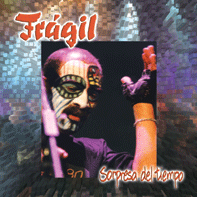
Comments:
Fragil are one of the best known rock bands from Peru. Their career goes all the way back to the mid-70s, and they released about 5 studios album over the past 20 years. Apparently, these guys recently reunited and put on a live concert with the addition of a 26-piece symphonic orchestra. Sorpresa Del Tiempo is a live recording of that show. While I'm not a big fan of "live" prog since prog bands tend to sound better in the studio, live albums by skilled and gifted musicians is always a treat for the ears. Fragil are one of those bands. While I'm not familiar with this bands studio work, although I'm familiar with their name, Fragil fall within the South American symphonic prog category. Their sound is colorful and optimistic with a vibe that is unique to South America. While some people compare them to Anglo bands like Camel, Genesis, and Jethro Tull this band comes closer to South American bands like Pablo "El Enterrador", Congreso, and Espiritu. I tend to hear certain neo-proggish qualities in some tracks, but symph-prog wins out in the end. The Spanish vocals remind me most of the Chilean band Congreso. They are quite melodic, and instantly likeable. Also, like the live Congreso album from 1987 that was released on CD a few years back, the fans that attended the show were absolutely happy to see Fragil live and simply add to the ambience of the CD. I heard that the audience for Los Jaivas go absolutely ape-wild, and sing out lyrics for entire songs(sometimes getting louder than the band). While I didn't totally believe the stories I read, after hearing Sorpresa Del Tiempo I'm convinced that the best concert fans are in South America. These folks love live music. My only complaint with this CD is that while it starts off with strong material, by the time you get to the 10th track the energy level goes downhill. While you get your money's worth with the first 10 songs, I consider the rest of the material filler. Overall, I'm going to check out some studio albums from these guys. Their live show is very impressive.
Webpage:
Musea Records
Trespass - In Haze of Time
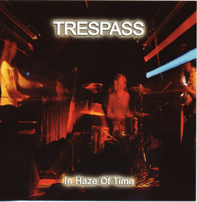
Comments:
Fans of vintage keyboard-based prog will be in for a treat with this CD. Trespass are a new 3-piece band from Israel, but they released a CD featuring music that could have
easily come out of another era. This 3-piece band is led by virtuoso keyboard player Gil Stein, and he is supported by a top-notch bassist, and drummer. Keyboard-wise, I hear Hammond, piano, and occasional synth leads. Gil also plays guitar on several tracks, but that instrument never leads. To my ears, Trespass comes close to ELP mixed with the playfulness of Trace and Finch(without the guitar leads). These guys love to swing jazzy Bach-influenced keyboard lines in odd time signatures, to give you a general idea. The CD booklet mentions that the band decided to keep a "free and breathy" sound, and those two words also fit perfectly with the style of prog on this CD. While instrumentally things get complex, I found the lyrics rather simple in nature. My guess is that the band wanted to balance out the frenzied playing with something easy-going. So, instead of singing about complex "prog" topics in a lengthy manner, the guys repeat simple sentences such as "I'm lost in time!" or "I'm in the mood to love you, baby". While this might surprise some prog fans, I found the simple lyrics a good balance to the complex instrumental sections. The use of 70s-styled vocal harmonies is likeable. Overall, this is on my Top 10 list of new releases. The vintage sound combined with incredible musicianship, and playful ideas will impress most fans of keyboard-based prog. Album number two already sounds like a monster!
Webpage:
Musea Records
Flaming Lips - Yoshimi Battles The Pink Robots
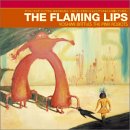
Comments:
After completely giving up on ever finding new American pop music of high quality, I started hearing about the Flaming Lips' new album. Reviewers, fans, and newbies were claiming Yoshimi Battles the Pink Robots the "pop masterpiece of the year", featuring music that was better than Radiohead's recent output. Well, I recently got my hands on the Lips' new CD, and I'm totally impressed. I'm not familiar with the Flaming Lips' catalog, but this band has a 17-year history doing experimental pop music. On Yoshimi... the guys play a form of spacy electronic-pop that mixes Yes, Jean-Michel Jarre, and Beatle-esque explorations with late-60s Italian/French melodies and a hint of modern soul. The emphasis here is on beauty, and creating music with a timeless quality to it. The melodies throughout the album are some of the finest crafted lines I've heard in pop music in years. In fact, there isn't one filler track on the album. Prog fans will definitely love to hear that there are all sorts of "prog" influences in each track, from Yes to mid-70s Genesis, Gong, Pink Floyd, and Khan. FL's vocalist has a high-pitched voice that reminds me of Steve Hillage's singing with Khan, but, every once in a while, I also hear hints of early Peter Gabriel and mid-70s Phil Collins during some of the passages. While the music isn't trying to be complex, instrumentally speaking, the synth work will impress most keyboardists. The Moog-like synths are mostly spacy and drenched in echo and delay, while some of the synth-bass work reminds me of a space-funked Radiohead. Mellotron is heard on some of the tracks, and is either loud in the mix or buried under tons of gorgeous vibes, string, and electronic piano tones. Oh yeah, I forgot to mention the great acoustic guitar strumming throughout the tracks. Some prog fans might get annoyed by the use of drum machines, but I've got to say that the drum machines add a modern quality to the music that will appeal to a younger generation. I'm sure the Lips had to find a way of mixing prog/psych influences with a modern sound that would please the folks over at Warner Bros Music. While the band doesn't apologize for trying to make a profit, Warner Bros clearly gave them the liberty to come up with a quality product. Overall, I'm quite moved by Yoshimi Battles The Pink Robots. "In the Morning of the Magicians" has got to be one of the best songs written in the past 10 years, and it reminds me of Yes's "Wonderous Stories" and "Soon" mixed with Jean-Michel Jarre. I hope this country gets more bands willing to go on a limb, and craft ear-pleasing, non-angry, pop such as this. We have had to put up with so much awful metal, and R&B garbage on the radio that hopefully pop musicians will once again concentrate on melody, instrumental depth, while staying clear of cliches.
Webpage:
Flaming Lips
Goisman - Words of Meaning and Purpose
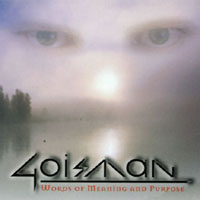
Comments:
Goisman is a solo project by bassist/guitarist/vocalist Steve Goisman of Arizona. He
seems to be active in the Tucson, Arizona, music scene with several bands and projects, but Words of
Meaning and Purpose is the first CD of a 4 CD "solo" project. While Steve handles most of the work, he is helped out on drums and saxophone by other musicians. The music here
is classified as "Alternative Progressive Rock", and that label sort of fits. The first thing that came to mind when I heard Steve's CD was a combination of early Rush with Phish.
While Steve's vocal and bass work reminds me mostly of Geddy Lee, the rockabilly/country/funk guitar playing comes close to Trey Anastasio's work with Phish. The 8 tracks feature traditional verses that lead to choruses that later lead to short intrumental sections. Almost all of the music is friendly enough for alternative rock radio, yet the Rush-like instrumental work underneath the vocals might only impress prog fans. I found most of the music catchy, and well composed. While I think Steve sometimes pushes his voice over his natural limit, he does have a charismatic style when he stays within his range. Since I'm not a lyrics sort of guy, I found the lyrics rather average. Overall, if you like more commerical forms of prog, or if you like early Rush, you might want to check Steve out.
Webpage:
Goisman
Nicola Randone - Morte di un Amore
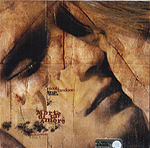
Comments:
Wow! Every once in a while, I receive a CD that doesn't fall
completely in the prog category, yet manages to blow me away as
a total work of art. Nicola Randone's new CD, Morte di un Amore,
is such a work. The first thing that every listener will notice about
Nicola's music is his voice. He is one of the best Italian rock singers
I've heard, and he proves it 30-second into the first track. His instantly likeable voice is somewhat pop-oriented ala
Eros Ramazotti, yet it's so rich with melody, feeling, and expression that prog fans will
instantly dig it. There is also a noticeable theatrical and cabaret influence in the vocals that will
especially impress fans of Italian and French prog. What is funny, is that a few weeks ago I wrote a review
for La Maschera di Cera in
which I stated that young Italian singers have lost touch with the beautiful vocal melodies that
their parents were singing in the late 60s and 70s while prefering a droning sort of whine. Well, Nicola proves that some young people are interested in continuing the Italian vocal tradition at the highest quality. Instrumentally speaking,
Nicola seems to prefer a grandiose symphonic sound that allows his voice to soar. Modern
keyboards take care of the symphonic sounds, while acoustic guitar strumming
lies deep in the mix. I'm reminded a bit of Dream Theater at their most symphonic, yet
Nicola's music is not prog metal. Some ambient, Reggae, and pure-pop influences appear from
time to time, but overall this album is mostly artistic symph-rock. I rate this CD
one of the top releases this year, and especially recommend it to fans of Italian progressive rock. Don't expect anything
complex musically, but the vocals rate up there with Locanda Delle Fate, Banco, and
I Giganti. Maybe La Maschera di Cera should hire Nicola for their next album.
Webpage:
Nicola Randone
Smokin' Granny - Tarth Shooke
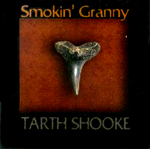
Comments:
Smokin' Granny is a 5-piece band from North Carolina, and Tarth
Shooke is their new release. This CD is quite diverse from beginning
to end. It took me about 2 weeks of listening to get a good feel for the
music here, because of its originality. While the CD starts off with a RIO-like sound similar to bands
on the Cuneiform label, the band quickly starts to concentrate on laid-back
grooves featuring dissonant interaction between electric and acoustic guitar,
saxophone, bass, and drums. The CD consists of 18 tracks that somehow piece together to
form a whole. While some tracks don't always fade into the next one, I hear some sort of
continuity from track to track. Once in a while, the musicians start to explore
jazzy forms of sounds, while other times things get very avant-psychedelic.
A good comparison would be if you took Henry Cow during the Legend sessions,
slowed their tempo down by half, and added a modern ambient King Crimson sort of sound.
What you would get would sound close to the music on Tarth Shooke. Personally,
I love this sort of music and recommend it to RIO, space rock, and avant-prog fans.
I think RIO fans might have to get use to the slower tempos, while space rock fans
will love the dissonant psychedelic explorations.
Webpage:
Smokin' Granny
Martigan - Man of the Moment
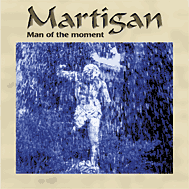
Comments:
Martigan is a 5-piece band from Germany with one other CD under their belt, and Man of the Moment is their newest release. To my ears, Martigan play a form of neo-progressive rock that is also influence by progressive metal, ala Dream Theater. Lead singer Kai Marckwordt comes very close to sounding like Peter Gabriel. In fact, he is responsible for pushing this CD above the countless, similar-sounding, neo-prog releases that are unleashed each year. While he has a noticeable accent, it works incredibly well and shouldn't bother most listeners. The music tends to mix a sound similar to late-70s Genesis with the technical and symphonic aspects of Dream Theater. While this might sound a bit odd, it works rather well. Man of the Moment has 10 tracks total. Most of the better tracks end about the 10-minute mark, while a few of the shorter tracks go the commercial route. The more commercial tracks don't sound appealing to me. They tend to have a dated "80s" sort of sound that doesn't work anymore. The longer tracks, though, are high-quality. I tend to concentrate on Kai's interesting voice, but the modern Genesis-meets-Dream Theater themes are excellent. Overall, I would have to recommend this CD mostly to neo-prog, and possibly even Dream Theater fans(especially if you liked 6DoiT). If you enjoy albums from 70s Euro-prog bands that offered a strong Genesis sound, you might want to check out this CD too.
Webpage:
Martigan
The Red Masque - Victoria and the Haruspex
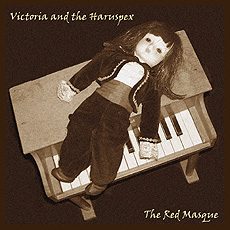
Comments:
Wow, I can't believe how much this band has grown since their 2001 release, Death of the Red Masque. The Red Masque started playing in 2001. Influenced by prog bands like Van Der Graaf Generator, King Crimson, Gong, St. Just, and avant-garde classical music the band released an EP that quickly got the attention of the avant-prog world. Now, just a year later, the band is back with a powerful full-length CD. For a band this young, Victoria and the Haruspex is quite an accomplishment. The CD starts off with a 24-minute track entitled "Haruspex". This piece slowly builds from avant-garde experimentation to Crimson-like jamming. The first thing that struck me was how colorfully rich the sounds coming from my speaker sounded. The band's palette of sound is larger than most other modern bands. Toy pianos, a musical China Doll, Harp, lo-fi synth, and kitchenware mix freely with the traditional electric guitar, bass, and hammond organ set-up. The 24-minute epic seems somewhat composed to my ears(or at least certain sections sound composed structurally), but it's possible that it was completely improvised. If so, the band recorded an inspired session. My favorite compositions follow the epic. "Birdbrain" will be regarded as one of the band's classic. This piece sort of reminds me of some of Peter Hammill's early solo work mixed with a Morricone-esque 70s Italian sound similar to bands like Biglietto Per L'Inferno and Banco's Darwin. The beautiful "Afterloss" quickly follows, and features melodic interplay between acoustic guitar and harp. This piece could be compared to the sound on St. Just's first album, with its dark psych-folk influence and melodic beauty. "Cenotaph", a darkly romantic classical composition for solo harp, closes the CD. I read many reviews of Death of the Red Mask, and it seemed that some people either liked Lynette Shelley's vocals, or didn't get it. On Victoria and the Haruspex, Lynette's vocals tend to be less avant-garde and deep. Instead, she prefers a clearer avant-girl sound similar to groups like U Totem, After Dinner, Hatfield and the North, and National Health. And the use of backward vocal reverbs and a made-up language during some sections adds a scary, out of this world, element that I've rarely heard in rock music. Victoria and the Haruspex is in my 2002 Top 5 list. This avant-prog album takes its influences to a new level without falling trap to cliches and imitation.
Webpage:
The Red Masque
La Maschera Di Cera - La Maschera Di Cera
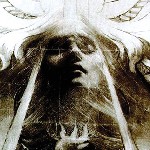
Comments:
Oh no! Not another hyped prog band from Italy. It seems that every year, you hear about another new Italian prog band that is hyped to death. The reviews tend to always sound better than the actual albums, and after a year, or two, these bands almost always disappear completely from the scene, and their albums are soon forgotten. Last year La Torre dell'Alchimista was the Italian prog band du jour. They actually put out a great album, but the themes and compositions weren't impressive enough to compete with the classic Italian prog bands from the 70s. This year, I started hearing about La Maschera Di Cera. After ignoring the hype for several months, I finally opened up the wallet for the CD. Well...err...hmm...I'm impressed! My first listen left me with a bad impression of the music, since I had to shake off the hype. But after several spins, it was clear that these guys put out a top-notch album. First of all, the CD pretends to be a long-lost 70s Italian prog LP that was recently unearthed and reissued for the first time. The album-cover has sort of a 70s Spanish-prog style going for it that will attract the attention of 70s rock collectors. And if you look at the back of the CD, you will also see that the band split 40 minutes of music into Side A and Side B, each featuring 20-minutes of music. "Side A", or track 1 on the CD, is a 20-minute epic that will recall the days of Museo Rosenbach, and Osanna's hard-rocking moments on Palepoli. Like Museo Rosenbach's "Zarathustra", the listener is treated to a mysterious sound and strange compositional structure that takes several listens before making sense. But once it does, you'll be in for a treat. The band plays typical guitar, bass, hammond organ while adding mellotron, VCS 3 synth, tympanis, and flute to the mix. The vocals sort of bother me, but I'm slowly getting use to them now. You see, the one thing that bothers me about today's young Italian singers is that they can't seem to create catchy melodies like their parents did in the late 60s and early 70s. Today's Italian vocalists are grating and almost droning, while their parent's vocal style had a romantically melodic, emotional, and swinging sound that is still appealing today. That being said, the vocals on La Maschera Di Cera are good and definitely better than the ones on La Torre dell'Alchimista, but they fall short from competing with the classic Italian bands from the 70s. But, as I write this, I'm getting use to the vocals on this CD, so my opinion might quickly change. "Side B", or tracks 2 through 4, are a bit more rocking and symphonic in a grand Van Der Graaf Generator sort of way. While parts of the first two tracks drone on a bit here and there, the album closer ends in such a dramatic way that it will leave most listeners wanting more. My only other complaint is with the drummer. He plays rather straight-forward, and apparently doesn't seem familiar with Italy's countless energetic prog drummers. Aside from these minor flaws, La Maschera Di Cera managed to live up to the hype. I still think Deus Ex Machina's new album, Cinque, is the top album of the year, but I'm more of an avant-prog fan. For symphonic prog fans, though, La Maschera di Cera is definitely one of the best Italian symphonic prog albums to come out since Locanda Delle Fate.
Webpage:
Mellow Records
Sigmund Snopek III - First Band on the Moon
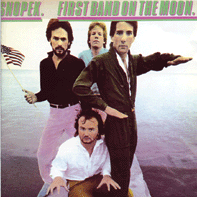
Comments:
I didn't have a good feeling when I saw the CD cover to Sigmund Snopek's First Band on the Moon, and my first listen didn't leave a favorable opinion either. But after a few spins, this odd album from 1980 revealed its simple charm and quickly became likeable. Sounding like a mixture of mid-70s David Bowie, Queen, and New Wave bands like the Talking Heads, Devo, and the Suburban Lawns First Band on the Moon sounds dated these days. But the combination of catchy song-writing, and frequent maneuvers into prog territory saves the album from being thrown out with the rest of the musical garbage that came out in the 80s. Like many New Wave bands from early 80s, Snopek play a form of pop music that is disjointed, and dissonant. Rather than being completely synth-based, though, Snopek also feature guitar, bass, and drums. The vocals tend to fall in the pop domain, and go from sounding cool to sounding cheesy, in a whiter-than-white midwestern USA sort of way, quite frequently. While Bowie sounded cool mixing 1950s whiteboy rock n' roll vocals with avant-garde pop, Snopek miss the mark by a hair. Overall, First Band on the Moon is an oddity that will find new fans. While its dated sound will turn off 70s-prog collectors, collectors of some the weirder bands from the 1980s will find this album rather fun.
Skeem - Skeem
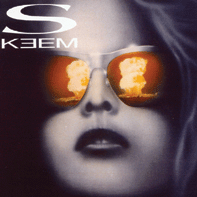
Comments:
You know what my idea of hell is? It's having to listen to Skeem. Skeem is one of the worst albums I've heard. Apparently, no one told this neo-prog band that the 80s are over. So, they proceeded to create song-oriented neo-prog with terribly accented vocals and absurdly naive lyrics. I bet the musicians in this band still have some serious mullets. The 80s production value is unbelievable for something that was recorded in 2001. But what really does it for me are the vocals. Try being stuck in traffic while listening to an accented singer sing, "Lett's beeee gooood to won anodder, we just have toooo leeeeve togedder!". Is there really a market for 4th-rate neo-prog? If so, I would love to meet the people that listen to this stuff just to see what sort of music collection they own. People tell me, Steve, it must be great reviewing CDs and getting free stuff from labels. Yeah, right. When you have to listen to bands like Skeem, you tend to wish for complete silence.
Webpage:
Skeem
Tired Tree - Changing Sides
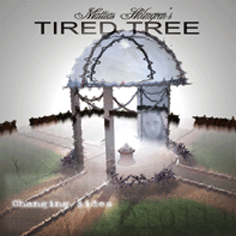
Comments:
Tired Tree is a side-project from Swedish musician Mattias Holmgren. It's also one of the worst CDs I've heard. I'm sorry, but I just don't get what's going on here. Either Mattias is in the early stages of having a hot new girlfriend, or he has the worst taste in music. Matthias is known as the drummer for a well-known Swedish metal band(which I have never heard of), but apparently he also likes 80s Phil Collins. So, he took that radio-friendly AOR sound, mixed it with the blandest Dream Theater, and added loads of thin vocals. I hate being negative on someone's art and passion, but when a CD sells for $16 new consumers need honest reviews. This album would have been better off on mp3.com. While I can see buying this CD so you could tell your friends that you own the cheesiest album ever recorded(a novelty item), unless you are a huge fan of Phil Collin's pop music watch out.
Osiris - Beyond Control - Live
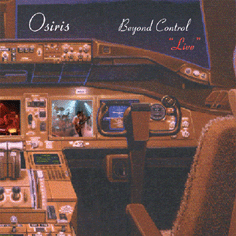
Comments:
Osiris are best known as the only prog band to come out of Bahrain. They have 2 studio albums out on Musea, and Beyond Control - Live is a newly released live recording dating back from 1991. Although I'm not familiar with their studio albums, Beyond Control - Live isn't really my cup of tea. The band tends to sound like a weaker Cast, with even worse vocals. While Cast's brand of neo-prog displays higher levels of complexity and color, Osiris play simpler compositions with tons of weak vocal sections that ruin it for me. The guitarist and keyboardist sort of save the show with some great soloing. While the guitarist reminds me more of a 80s metal guy into Iron Maiden and the Scorpions(and he does a fine job), the Moog solos from the keyboardist will appeal to most prog fans. Again, if you've read this website you've heard me rant about prog bands who include bland vocals over great instrumental music. And, unfortunately, Osiris are part of this club. If they had created instrumental music that mixed traditional music from Bahrain, this band would be killer. Unfortunately, they sound like a 3rd rate neo-prog band. If you like neo-prog then you will probably like Beyond Control - Live, if not don't bother.
Deus Ex Machina - Cinque
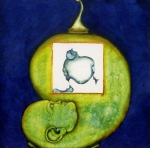
Comments:
Deus Ex Machina are one of the top modern Italian prog/jazz-fusion groups active today. Most casual Italian prog fans know DeM as the band with the odd singer that sings in Latin. While Latin lyrics, and Alberto Piras's avant-garde vocals might not be for everyone, this band is simply top-notch in the studio and on stage. Cinque is a brand new release on Cuneiform Records, and it's one of the best new releases I've heard in 2002. The band's compositional style is similar to the classic De Republica, but the guys have matured both compositionally and as musicians. The first thing that struck me after playing the CD for the first time was that the frenzied progressive jazz-funk coming out of the speakers reminded me of early-70s Miles Davis mixed with the best Area(less metal, more jazz-fusion!). Melodies are jagged, futuristically dissonant, the rhythms turn on a dime, and the grooves are intense. While this might sound like too much for some listeners, like 70s Miles Davis and Area, the controlled chaos is also tremendously funky. DeM's instrumentation consists of guitar, violin, keyboards, bass, and drums. Soundwise, Cinque is one of the best recorded CDs I've heard. Bravo Sound Engineer! Cinque has that 1970s warm quality that attracts most record collectors to vintage rock music, while also having the crystal clear quality that modern equipment offers. While I was disappointed with the sound-quality of De Republica(which has kept me from really enjoying the music), Cinque exceeds expectations. The musicians sound like they were recorded in a medium rehearsal room. This is especially apparent with the guitar tone, which makes it sound like Magrino Collina is playing in your living room. The keyboards, which feature Hammond, and ARP synth recall the best vintage prog recordings. As for Alberto Piras, as always, he offers wonderfully complex vocal gymnastics that pay tribute to Area's Demetrio Stratos. Overall, Deus Ex Machina now rival some of the best jazz-fusion bands from the 1970s. The sky is the limit for this progressive jazz-fusion band.
Ange - Tome 87
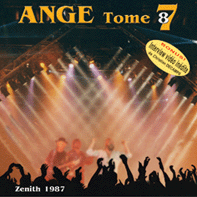
Comments:
Tome 87 is a live recording at the Zenith in Paris. Along with Magma, Ange are considered the top progressive rock group to come out of France during the early 1970s. After a 30-year career, the band is still actively recording and playing live gigs. Tome 87 seems to have gained fame amongst music collectors as an album featuring the much-loved band at their best. Fans of Ange will be glad to know that most of the tracks on the CD come from albums such as Le Cimtiere Des Arlequins, Au Dela Du Delire, Emile Jacotey, and Par Les Fils Du Mandrin. That's the good news. The bad news is, if you're not into "live" recordings from your favorite prog artists, this CD will most likely not change your mind. The most serious problem for me is listening to modern synths recreate the sound of Ange's famous organ. To me, the reverb-drenched organ featured on the classic 70s LPs defined Ange's "sound". The modern sounds on the live album sound a bit cold. Another problem that I found is that Christian Decamps forgets tons of lyrics. His vocal delivery easily goes from strong and confident, to sloppy and lazy. If you don't know French I doubt that this will be a problem, but French speakers will instantly notice the mumbled singing from Decamps. Overall, I recommend Tome 87 to hardcore fans of Ange. If you're just getting started with this band, try Au Dela Du Delire.
Webpage:
Musea
Nnecra Packę - Paracelse
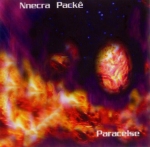
Comments:
Nnecra Packę is a French band that began jamming together back in 1996, and Paracelse is their debut album on Musea. The music on Paracelse mostly reminded me of a spacier version of Starless and Bible Black-era King Crimson, although I have to credit Nnecra Packę for not rehashing common King Crimson cliches. Listeners will instantly notice that most of the tracks sound like drone-like jams mixed with dissonant guitar work and spacy studio effects. Musical themes don't try to make emotional connections with listeners, but, rather, invite listeners on sound-trips that conclude every 4 to 22 minutes. Considering this, I recommend Paracelse mostly to fans of space rock and krautrock. King Crimson fans might also enjoy the dissonant guitar work on most of the CD.
Webpage:
Musea
Taproban - Ogni Pensiero Vola
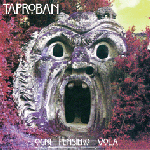
Comments:
Taproban are a new 3-piece(keyboards, bass, and drums) Italian band, and Ogni Pensiero Vola is their debut album on Musea. For a debut album, Ogni Pensiero Vola is good. The album features great playing from the 3 musicians, and interesting compositional ideas. Yet, at the same time, some passages also somehow manage to fall trap to tired prog cliches. The most interesting thing about Taproban is the bass and drum interaction. The Rutherford/Collins rhythmic style adds that element of rhythmic uncertainty that generally keeps ears awake. The keyboard playing reminds me mostly of Le Orme, and listeners will get treated to tasty keyboard lines and interesting tones from modern synths. Overall, most of the themes on this CD are pleasant, and the minimal Italian vocals are fine. Unfortunately, the prog cliches used during certain sections stand out like a sore thumb, and tend to bring the album down a notch. First, if you're in a prog band and you create a rhythm that will instantly remind listeners of a certain early-Genesis track, don't use it! Second, if you want to show people your Klaus Schulze influence, don't play the same tired argeggio used by countless other bands. You know, if modern prog bands are not careful enough to eliminate cliches in their music, music fans will forever stick to the vintage bands. I don't want to sound harsh, but when you buy a new CD in 2002 you're not in it to hear rhythms from 1973. Y'know what I mean? Ogni Pensiero Vola, aside the flaws I pointed out, is a good debut, and Taproban have potential in the future. If you're looking for a decent modern Italian prog band to get into, these guys are a good choice. Otherwise, get the new Deus Ex Machina.
Webpage:
Taproban
Stereo Kimono - Ki
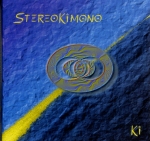
Comments:
Stereo Kimono are a trio from Italy, and Ki is a brand new 8 song release. The band, if my limited knowledge of Italian is correct, have been together since 1989. They managed to produce 2 demo albums, with much of that material now featured on this CD. Stereo Kimono are entirely instrumental, and remind me mostly of a mellower and less-frantic DFA. The tracks tend to mix dissonant jams with ambient explorations. When I first heard Ki, my biggest problem with the album was the non-catchy themes. Nothing attracted my ears to the sounds coming out of my speakers. Later, after playing the album a few more times, the themes managed to leave an positive impression. Although Ki doesn't have that timeless quality to it, the music is properly composed, played, and recorded. After a few plays, the music grows on you. Overall, if you are a DFA fan, I doubt Stereo Kimono will impress you, but if you tried DFA and found them a little too frantic for your taste, Stereo Kimono might be perfect for you.
Webpage:
Stereo Kimono
Hostsonaten - Springsong
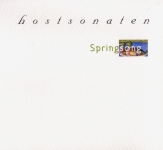
Comments:
Hostsonaten is a side-project led by Finisterre's bassist, Fabio Zuffanti. To date, he has three albums under Hostsonaten, and a rock opera entitled Merlin. Springsong is a brand new release consisting of 9 tracks. The CD comes in a digipack, including individual cards for each track on the CD. Each card depicts medieval drawings of animals on the front, and a list of musicians used during the recording sessions. The music itself is entirely instrumental, and mellow. Groups like Celeste, Harmonium, and PFM's quieter moments quickly come to mind as your ears focus in on instruments like the flute, violin, piano, 12-string guitar, and soprano sax. Of course, bass, electric guitar, and percussion play a part on most of the tracks, but with less dominance. To my ears, most of the music seems influenced by classical music. At times, I also hear jazz, new age, celtic, and 20th century classical elements thrown in for extra color. The odd thing, though, is that 80% of the themes don't really stand out in any shape or manner, yet I found the whole CD enjoyable to listen to in the car. Could Springsong be a new form of modern ambient music with a bit more going on instrumentally? It sounds that way, anyway. Fans of Genesis's pastoral moments, Trader Horne, and Maneige's gentler sections might also want to check this album out.
Webpage:
Sublime
Archetype - Dawning
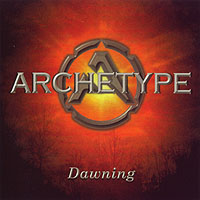
Comments:
Archetype are a new 4-piece prog-metal band from Ohio, and their album Dawning comes as a breath of fresh air. Unlike most prog-metal bands, who only seem influenced by Dream Theater, the guys from Archetype are bringing a new approach to the classic sounds from early Helloween(Kai Hansen/Michael Kiske-era), Iron Maiden, and early Judas Priest. But instead of repeating the cliched formulas found in other metal bands influenced by Helloween, Maiden, and Priest Archetype turn the complexity level up several notches and offer compositions that overflow with interesting themes, rhythms, and catchy vocals. What makes this band really stand out is the level of musicianship. The 4 musicians are top-notch, and that includes the vocalist. The first thing that will stand out for most listeners is the twin-guitar interaction from guitarist Chris Matyus. The multi-tracked guitar-lines recall the days of early Helloween, when Hansen and Weikath composed complex, and quite colorful, guitar duels that boggled the mind. Archetype, though, surpasses Helloween by adding complex twists and turns that keep your ears wide awake. Out of the 10 tracks featured on the CD, I found the first 6 killer. A couple of the next tracks lose intensity a bit, but, fortunately, the CD ends with an excellent 12-minute epic. In all, prog-metal fans are in for a treat. Hopefully, Archetype will convince other prog metal bands to explore musical territory that does not immediately remind listeners of Dream Theater. Dawning rates as one of the best prog-metal albums in the past 10 years.
Webpage:
Archetype
BayProg Compilation CD
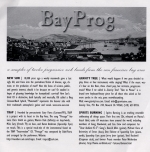
Comments:
BayProg is a free compilation CD of well-known Bay Area prog-related bands, and is part of Expose Magazine's Spring 2002 issue. After listening to the bands featured here, it appears that Bay Area prog is split into 2 distinct camps. First, you have the Rush, Dream Theater, Genesis, and Queensryche influenced bands. The style of music by bands like New Sun, Gravity Tree, Spirits Burning, and Metaphor, compositionally-speaking, is excellent and should appeal to fans of more commercial forms of prog. I find in those bands, though, that it's really hard to tell them apart. Track 3 from Gravity Tree and Track 4 from Spirits Burning, for example, sound like they came from the same band. Metaphor and Mind Furniture offer more originality, but these guys could really kick ass if they had hundreds of influences rather than just a hand full. Of course, from a commercial point-of-view these bands stand a better chance of selling lots of CDs. But, at the same time, these groups don't represent what the Bay Area music scene is mostly known for. Eccentric bands, and composers that push the boundaries of sound, have long been part of the San Francisco scene. BayProg features a few of these exciting musicians. Sleepytime Gorilla Museum should be well-known to most prog fans. This Oakland band plays a style of prog heavily influenced by RIO, Indonesian Gamelan, and modern metal. They are easily the best band in San Francisco right now(maybe even in the USA), and the best band featured on BayProg. If you haven't seen them live yet, trust me, check out their show if they come to your town. Michael P. Dawson is a unique composer from the San Mateo area. I'm familiar with his older work, which seemed influenced by Frank Zappa's classical works for computer, but his track features music influenced by Univers Zero, and mellower RIO groups like Nazca. Trap is a traditional RIO band, and their track proves their talent at creating a frenzied mix of Zappa-like melodies with Univers Zero-like rhythms. Amy X Neuburg & Men offers the most unique track of the bunch. Her track mixes prog, metal, and girl-ish vocals with German oompa-oompa influences. The music slowly builds from a metal dirge to something straight out of National Lampoon's European Vacation(I love it!). Overall, my best advice, if you are in San Francisco and want to check out the experimental music scene here, is to check out the Bottom of the Hill club around 16th street. You will find tons of interesting bands, non who qualify as "prog", who are doing some pretty interesting shit. BayProg offers a glimpse at the scene out here, but features mostly straight-forward prog bands. If you're mostly into RIO, the avant-garde, avant-jazz, ethnic fusion, and electronic experimentation only a few bands will appeal to you here. But if you are into friendlier forms of prog, you will enjoy the majority of this compilation.
Ashqelon Quilt - The Event
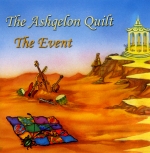
Comments:
Ashqelon Quilt are a young 3-piece prog band from Israel, and The Event is their debut CD. The band's music mixes mostly British-prog influences with psychedelic-laced vocals(in English). They also enjoy to add Celtic and Middle Eastern influences to their compositions, and I also hear neo-prog sounds every once in a while. If I was to come up with a good description of this band's sound I would say that if you took Jethro Tull's lighter medieval/Celtic moments, mixed in Syd Barret-like vocals, including female vocals, then you would get something similar to Ashqelon Quilt. The lyrical style recalls the late-60s psychedelic rock scene, and have a naive quality that might not appeal to hardcore prog fans. Out of the 9 tracks on the CD, the first six, and the last track, are high-quality. The other two tracks feel more like filler. Overall, I would recommend The Event to fans of bands like Yoke Shire, Raison De Plus, Bread, Love, and Dreams, and Jethro Tull's newer music.
Webpage:
Ashqelon Quilt
Arti & Mestieri - Murales
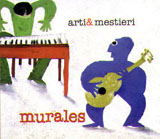
Comments:
How is the new CD from Italy's Arti & Mestieri, you ask? Hmm, you know, the recent trend of getting classic bands to reunite to record new material hasn't really succeeded in producing a "masterpiece" or even a classic album. So does A&M have a little surprise for us? Hmm, I remember thinking back in 1995, or so, that the thought of getting a new album by Locanda Delle Fate, Banco, Museo Rosenbach(you name it, really) as exciting. But, when those albums were eventually released, the compositional magic within these guys during the 1970s was clearly lost in the 90s(and probably lost by 1981). So, cynicism quickly took over, and I stopped paying attention to "comeback" albums. I mean let's face it, most of the 20-somethings that recorded our favorite classic prog albums most likely wrote the music to get laid. Add to that fact the carefree drug culture, the emerging synth/guitar/effects technology, the fusion of musical genres from around the world, and you had an era full of invention(and easy carefree sex). But, 30 years later, record labels can't really expect the now 50-somethings to find the motivation to re-discover the youthful energies that led them to impress the world. And so the dozens of comeback albums released in recent years have failed to cause any excitement. So, do these folks do it for the money, for nostalgia, for their egos, or to pay off ex-wives? Who knows? I'm sure that the fast sales of comeback albums in the past is quickly slowing down as more people become cynical about getting high-quality music. But, I'm sure the completist market will continue the push some demand for comebacks. Ah, so how does Murales stack up? I was sort of shocked when I first heard A&M's comeback album. I love A&M's Tilt, which was released in the mid-70s. That album not only featured fierce drumming by Mr. Furio Chirico(one of the best drummers from the 70s), but the entire album overflowed with Mediterranean charm, not to mention monster jazz-fusion passages and lovely symphonic interludes. Today's A&M, not surprisingly, clearly show their age on Murales. The playing, overall, is much slower than expected, especially coming from Chirico. But, I'll admit that a few of the tracks are of decent compositional quality. The style of Mediterranean jazz-fusion played by A&M on those tracks is likeable. The musicians don't seem to have the drive to do anything fancy, or experimental, but what they play is done perfectly. Unfortunately, as somewhat interesting as the first few tracks on the CD are, the band eventually ends up in modern-jazz mode, or if you will AUTO-DRIVE! That I expected, since our world is filled with this modern-jazz junk. But, what really shocked me was the overall digital(slick) sound used throughout the album. I don't really see how a band could have expected fans of Giro di Valzer Per Domani and Tilt to buy into this ultra-modern sound. Actually, since the band decided on this sound, Murales would be better marketed to modern-jazz fans rather than proggers. In all, what can I say, another "comeback" album comes, and goes, and most of the prog world yawns. More than a few tracks are enjoyable, so if you're very curious you can always pick a copy of this CD up. Don't get too excited, though.
Dreamland - Underwater
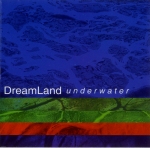
Comments:
Dreamland is a 2-man ambient project from Texas. I'm not that experienced reviewing ambient CDs, and find it one of the most difficult genres to talk about. How can one go about describing sounds that float, drift, vanish, and reappear over long periods of time? Brian Eno stated, back in the 70s, that ambient music acts both as a texture, leaving out melody, rhythm, and harmony, while also drawing the listener's attention, on occasion, with volume swells and increased complexity. Yes, that is a perfect explanation. There is also a quote in the Underwater CD booklet that perfectly captures the sounds on this album, and it states that "Dreamland achieves moments of symphonic elegance without ever sacrificing minimalist integrity.". What a perfect description. I can tell you that Underwater consists of 4 tracks(although the 4th track is broken down into 5 sections). The sound-quality of the album is excellent, and the tracks are all warm considering that most of it seemed to have been done with digital equipment. Whether you will like this, or not, depends on what you think of ambient music. Personally, I can only take small doses of this stuff before I slap on Ruins or Etron Fou Leloublan on the CD player. But all of us need atmospheric music to relax, drive, or study with, and for those situations these sort of projects fit perfectly.
Muvovum - Xox-alekwrt
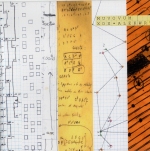
Comments:
Where did these guys come from, and why has the prog rock/RIO community ignored them? Muvovum are a 3-piece avant-rock instrumental band from New Orleans, Louisiana. Started in 1997 as an improvisational experimental group, the band quickly moved on to playing mostly complex, written, material while keeping some of their older improvisational style . So what do they sound like? My closest description of Muvovum would probably mention that if you took Legend/Western Culture-era Henry Cow, gave them 4 cups of Kava Kava tea each to drink, and got them started on Rhodes piano, lo-fi synth(ala Moog Satellite and Theremin), guitar, bass, and drums then that sound would probably come close to the sounds on this CD. The atmosphere on most of the tracks is menacing, yet dissonantly relaxed like some of Edgar Varese's gentler works, and features an advanced Schoenberg-like(atonal) melodic/rhythmic sound that keeps your ears constantly expecting the unexpected. Another influence that I should quickly mention is John Cage's "random theory" for composition, although what might sound random in Muvovum's music is most likely composed. I quickly noticed that most of the themes on the tracks are based on one guy starting a melodic line, while the others either finish the idea or expand on it. This approach also brought up Picchio Dal Pozzo's Abiamo Tutti I Suoi Problemi to mind. Themes are then rarely repeated the same way twice, and go through a series of variations. Fans of RIO will definitely dig this stuff and follow what's going on, while some casual music fans might fail to catch that the music is highly composed. I would say that 80% of the compositions feature complexity that rivals Henry Cow's Legend, while the remaining 20% consists of drones or abstract improvisations. At their most intense, Muvovum sound like a group of laid-back 60s jazz-musicians playing 20th Century avant-classical, but even their calmer moments feature a fair amount of detail. Overall, these guys are one of the top modern RIO bands that I've heard. The maturity level in each composition here forces me to scratch my head, and wonder why they haven't been mentioned more within the experimental music underground. Sure, New Orleans isn't known for progressive experimental rock, but with the internet Muvovum can now easily get mentioned along with the 5uu's, U Totem, Motor Totemist Guild, and Sleeptytime Gorilla Museum.
Xox-Alekwrt can be purchased at Wayside Music, waysidemusic.com.
Website:
Muvovum
Dream Theater - Six Degrees of Inner Turbulence
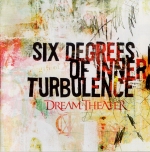
Comments:
The first major prog-related release for 2002 is Dream Theater's Six Degrees of Inner Turbulence. By now, the immediate question that comes to mind, after a new DT album release, is whether they managed to surpass their previous work. Aside from Falling into Infinity, a failed attempt at a commercial album, this well-loved 5-piece band has consistantly gone up in quality with each new set of songs. But, after 1999's masterpiece, Scene from a Memory, most fans realized that the boys would have a hard time outdoing themselves the next time around. So, has Dream Theater managed to beat Scenes from a Memory? Well, first, let me give you some info on the new album. Six Degress of Inner Turbulence is a 2-CD, 6 song, album. CD 1 consists of 5 songs, while CD 2 consists of one 40-minute track(made-up of 8 sections). CD 1 starts off with a bang with the Metallica(And Justice for All-era)-drenched monster, "The Glass Prison". This 14-minute track ranks as one of the band's best compositions. Besides the obvious Metallica influence, which begins to get you wondering why the band decided to copy instead of inventing, the listener is assaulted by gigantic metal grooves, and intense playing by Petrucci, Rudess, and Portnoy. After a great start, the question about whether DT managed to surpass Scenes from a Memory is unfortunately answered. The next 3 tracks, frankly, have their moments, but fail to really shine. "Blind Faith" starts off with a rather bland vocal melody, and only begins to gain momentum 5-minutes later. "Misunderstood", a catchy yet so-so track, has a noticeable modern-metal touch of "cool" while offering DT's brand of symphonic grandeur. "The Great Debate" features some great instrumental work, but the realistic lyrics about stem-cell research could turn alot of people off(I like listening to DT to get away from everyday stories on the news). Overall, tracks 2-4 leave you feeling underwhelmed. The final track on CD 1 entitled "Disappear", on the other hand, is among DT's finest work. Portnoy claims that they were trying to write a "ballad", but instead went for a more experimental approach. What we hear is a mixture of Radiohead, Ennio Morricone's prettiest, yet minimalist, melodies, added with drama that can rival the melodic approach of some of the modern Italian prog bands. My only complaint with this track is that at 7-minutes, it's too short! Overall, CD 1 features the highest of highs, plenty of bland moments, and countless sections that will remind you of Metallica, Megadeth, Tool, and Radiohead instead of Dream Theater. I think with music editing software, most listeners could chop off several minutes from tracks 2-4 and come up with a kick-ass CDR of CD 1. CD 2, on the other hand, is an absolute shocker that will probably appeal mostly to prog rock fans. The first thing that came to mind as "Overture" started playing, was whether the band got a hold of a few Cast albums(including Al Vidales's classical-sounding work). According to Portnoy, he's been listening to alot of Marillion. Yet the modern style of prog during some of the first few sections of the 40-minute epic, to my ears, sounds closer to some of Cast's newest albums. As "Six Degrees of Inner Turbulence" unfolds, many sections go on to sound like mini-tributes to early Genesis, Rick Wakeman of Yes, Slayer, and a variety of other classic prog/rock bands(Bruce Hornsby included!). The melodies throughout are excellent, but listeners can still expect a few cheesy sections(mostly from the lyrics, and James's macho-less moments) which are part of every Dream Theater album. Overall, as good as the music is on CD 2, you're mostly left wondering why Dream Theater decided to sound like other bands rather than continue to push their unique sound forward. I'm sure after Scenes from a Memory the guys wanted to have fun this time around. But most listeners will begin to wonder if Dream Theater reached the limits of their sound. The next album will probably feature less excess, and hopefully a return to a more original style. As fun as it is to hear Dream Theater sound like Tool, I would rather hear Dream Theater sound like themselves. In all, with 90-minutes of new music, most fans will find plenty to enjoy here. Prog fans will enjoy CD 2, while metal/prog metal fans will enjoy CD 1.
Sleepytime Gorilla Museum - Grand Opening and Closing
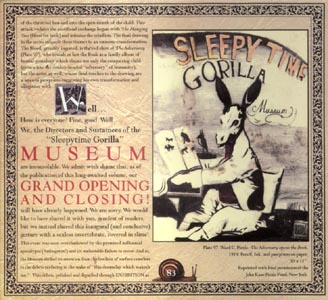
Comments:
Thanks to Peter Thelen from Expose Magazine, I decided to check out this new Bay Area band when they headlined the Bottom of The Hill club last summer with Uz Jsme Doma. At first, I went to the show to check out Uz Jsme Doma, who were scheduled to play that night as opening band. If you are not aware of the Bottom of the Hill in San Francisco, their shows start at 10pm and you usually get about 3 to 4 bands total, meaning that the main act starts around 1am. If you start work at 6am the next morning, it's sort of hard to stick around for the main act. But, well, I decided to remain at the club until the end, because Peter's rave meant that this band kicked ass. That night, though, Sleepytime Gorilla Museum started their show first, for some reason or other, and ended up blowing away everyone before the night even got on a roll. The sound that I heard that night combined Univers Zero-like melodies with some modern metal, Magma-esque drums and bass, Indonesian Gamelan, and a total Dada-esque, punk-art, attitude for the bizarre. These guys looked weird, played weird instruments, and some of the musicians even walked into the crowd, in the middle of a song, just to scare people. When SGM ended their set, I completely forgot about Uz Jsme Doma. Unfortunately, I was also short on money to buy their CD, which had not officially come out yet, so I had to wait for the official October 2001 release date before getting my hands on the little gem. SGM is made-up of guitar, bass, violin, and drums(the male guitarist and the female violinist also sing), but the band also loves to create 5uu's-like avant-garde sound effects on home-made instruments and toy pianos that sets them apart from other modern bands. The Univers Zero-like melodies, bizarre rhythms, and Gamelan-influenced percussion work that I remember from their live show are intact on the CD. What really surprised me, though, are the White Zombie-esque sections featured on some of the tracks. I'm talking about heavier shit than I heard at the gig that can compete head-on with most modern metal bands. However, SGM's dada-esque attitude towards metal riffs gives an awkward, disjointed, sound that will mostly appeal to prog fans. Some of the heavier sections also remind me of Änglagĺrd's Epilog, and even modern King Crimson. The Zappa-esque sections on some of the tracks also surprised me, because I didn't remember hearing Zappa influences during their live set. Those sections remind me of the 12-tone vocal section on "Brown Shoes Don't Make It", and some of Ruth Underwood's marimba melodies. Overall, Grand Opening and Closing is one of the top albums released in 2001. Fans of RIO(especially 5uu's and Univers Zero), Dada, avant-garde classical will be blown away by this masterpiece, but keep in mind that some sections get quite heavy. If metal isn't your thing you might want to test the music to see if you like it or not.
Website
Sleepytime Gorilla Museum
Where Echoes End - My Sweet Grotesque
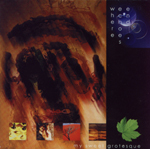
Comments:
Where Echoes End is a young Australian band that I was
introduced to a few years ago. Although their sound wasn't anywhere
close to progressive rock, they offered a style of artistic electronic soundtrack
music that was adventurous, darkly disturbing, and really unique. My
Sweet Grotesque is a brand new release from the band, and, stylistically
speaking, it's a complete departure from the debut album. The band decided
to add a female lead singer, and combine the disturbing tones of their debut
album with a friendlier "club" style of electronic music. I was surprised to hear
how "pop" their music sounds now. It's not something
you would hear in a hip-hop club, but I could picture this type of
music being played at some of the trendier Los Angeles clubs for mid 20-somethings.
Now, not everything is lost, of course, because many prog fans are into
poppier forms of prog. And alot of electronic artists have added proggy
elements to their compositions while appealing to a wider
audience. Where Echoes End are clearly
reaching out to a wider audience, while keeping a bit or their older style intact. Fans of
the debut album should expect a surprise. But fans of darker
forms of trendy electronic music will enjoy the music on here.
Website
Where Echoes End
Scott Mosher - Virtuality
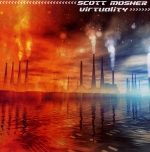
Comments:
I noticed on the back cover of this CD a humorous-yet-serious little note asking to "file under: ambient neo-progressive cyber-rock". Scott's music is definitely ambient, and I can see where the term "cyber-rock" came from. However, I was sort of surprised to see the term "neo-progressive" used to describe the music. I'm certainly not a neo-progressive expert, so I was expecting something influenced by mid-70s Genesis, and the 80s neo-prog crowd. Scott's music, though, is futuristic, and without even one drop of Genesis influence. A close description of the music could mention a mixture of 80s Jean-Michel Jarre(maybe even 80s-90s Klaus Schulze), with Dream Theater-like atmospheres(drumming, and melodies), and a hint of Rush. To make more sense of that description, the drums tend to drive the music in a Portnoy-ish sort-of-way. There is a futuristic ambience to most of the tracks that might remind the listener of Jarre. And, as the CD unfolds, many of the vocals surprisingly start to sound like Geddy Lee. Scott's take on ambient music is generally melodic, and engaging. I'm not a huge fan of pure ambient music, but Scott wants listeners to focus in on the music even during the mellower, flowing, sections. All of the tracks are done using warm sounding digital keyboards, analog-like tones, metal-ish guitars, bass, and drums. An 80s production sound is noticeable throughout the CD, yet I don't know of any 80s band that sounded like this. Jarre is a close comparison, but he was 100% electronic and doesn't feature the metal-ish sounds favored by Mosher. So this CD is quite unique. Overall, Virtuality will appeal mostly to electronic, and ambient fans who are somewhat into metal, but if you're a fan of both Rush and Dream Theater I'm sure the more ambient moments on this album will sound fine to you.
Website
The Ambient Mind
|
